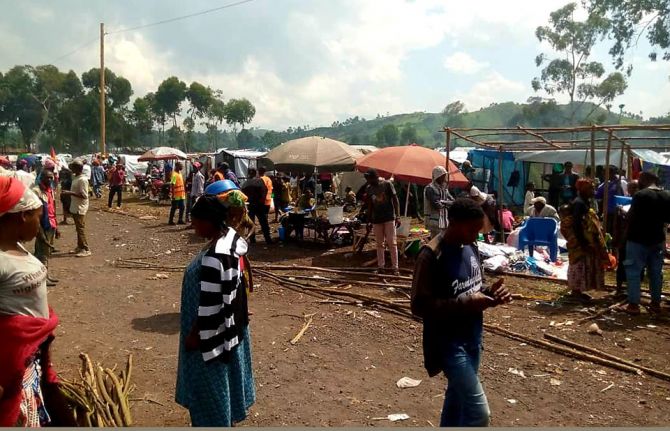

Press Release
UNAIDS is deeply concerned that rising violence in the Democratic Republic of Congo threatens HIV treatment and prevention services
02 November 2022 02 November 2022GENEVA/KINSHASA, 2 November 2022—UNAIDS is alarmed that fighting between government forces and rebels in the east of the Democratic Republic of Congo is causing serious disruption and harm to treatment, prevention and care services for people living with and affected by HIV.
In the health zones of Rutshuru and Rwanguba where some of the heaviest fighting has been reported, the AIDS Control Programme (PNLS) in North Kivu has registered 1155 people living with HIV currently on treatment including 102 pregnant women and 46 children. As the violence has escalated, large numbers of people have fled these areas in the past few days, most of them south towards Goma.
“I am extremely worried about the health and well-being of people living with and affected by HIV both in the areas affected by the fighting and in communities hosting those who have been displaced. People may have had to leave their homes at a moment’s notice without time to pick up essential medicines,” said UNAIDS country director, Susan Kasedde. “I am especially concerned about the situation of pregnant and breastfeeding mothers living with HIV and their babies. The interruption to treatment for these mothers will have catastrophic implications for their infants. It is a race against time and we must do everything possible to find these women urgently and link them to care.”
UNAIDS is working closely with national HIV programme managers, civil society groups, community organizations and all partners to support an emergency response to the current situation.
The following activities are being conducted as a priority:
- Verifying the numbers of people living with HIV currently on treatment to inform needs and planning going forward in the affected communities of Rutshuru and Rwanguba and in the host communities
- Conducting an assessment with humanitarian partners to enable the integration of HIV-related services into the joint response. This includes working with partner United Nations agencies including UNOCHA, UNICEF, WFP, UNFPA and UNHCR to gather information from civil society organizations to understand needs and capacities both in conflict-affected areas and communities hosting displaced people
- Rebuilding community support networks by contacting focal points of civil society organizations, community organizations such as mentor mothers, and service providers to establish a network with the capacity to help track and trace people living with HIV and to support the continuity of HIV services for them, including psycho-social services for victims of gender-based violence, and nutritional support to enable HIV treatment to be taken
- Supporting community-level efforts to ensure more effective messaging for people living with HIV and related to the protection of the rights of people living with HIV. UNAIDS is also conducting ongoing advocacy to strengthen the integration of HIV needs into the emergency response.
UNAIDS fully supports calls for the immediate cessation of hostilities made by the United Nations Secretary General, Antonio Guterres, and by the African Union.
UNAIDS
The Joint United Nations Programme on HIV/AIDS (UNAIDS) leads and inspires the world to achieve its shared vision of zero new HIV infections, zero discrimination and zero AIDS-related deaths. UNAIDS unites the efforts of 11 UN organizations—UNHCR, UNICEF, WFP, UNDP, UNFPA, UNODC, UN Women, ILO, UNESCO, WHO and the World Bank—and works closely with global and national partners towards ending the AIDS epidemic by 2030 as part of the Sustainable Development Goals. Learn more at unaids.org and connect with us on Facebook, Twitter, Instagram and YouTube.
